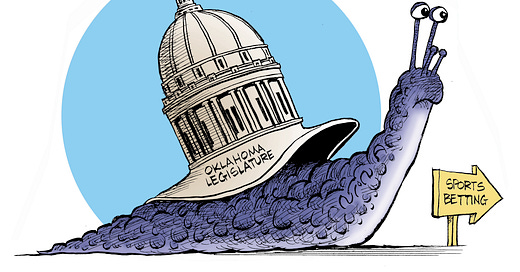When Will Oklahoma Get In The Game?
It’s a safe bet most Oklahomans will be watching today’s Super Bowl. After all, the Big Game annually attracts television’s largest single audience – 115 million last year.
What’s less certain is how many Sooners will have a stake in the outcome, aside from the six former OU standouts suiting up for the Chiefs and 49ers.
Though Oklahoma is one of a shrinking minority of states that hasn’t enacted sports betting, that doesn’t mean Sooners aren’t wagering on Sunday’s affair.
Some placed their bets by traveling to Las Vegas or one of four adjoining states that permit sports gambling. Others engaged the services of their favorite local bookies. Many more probably cast their lots in office pools.
So why hasn’t Oklahoma done the smart thing – legalize and tax a widespread activity – like neighboring Arkansas, Kansas, Colorado and New Mexico?
Well, let’s just say it’s complicated, beginning with the state’s puritanical roots. But – believe it or not – it’s even more complicated today as lawmakers weigh competing betting proposals while caught in the crossfire of Gov. Kevin Stitt’s nonsensical feud with Oklahoma’s tribal nations.
Oklahoma has seen this movie before, of course. Remember liquor-by-the-drink? Or the days before parimutuel gambling on horse races? Or the pre-medical marijuana era? Tons of Okies openly flaunted the prohibitions.
Finally, exasperated voters spoke, declaring in each case: Legalize it. Regulate it. Tax it. It’s a fact of life – get it out of the shadows.
So it should be now. It’s foolish to pretend sports betting isn’t already happening here. Or to regard it is some sort of fad that will go away if lawmakers stick their heads in the sand long enough.
Thirty-eight states, Puerto Rico and the District of Columbia now permit sports betting. In fact, 29 offer online wagering, which accounts for 77% of all bets. Who’s laying their money down? The largest single group is men, ages 35-44.
Arkansas provides an excellent case study for Oklahoma: Voters approved sports betting in November 2018, leading to sportsbooks in three casinos in 2019 and three online sportsbooks in 2022.
According to The Motley Fool, Arkansas’ gross sportsbook revenue since 2019 is $63.4 million, yielding more than $9 million in tax revenue. That may not seem like much given that Oklahoma’s state budget is projected to be nearly $9 billion for FY 2025. But $9 million could help chronically underfunded vital state services scrambling to meet ever-increasing state needs.
A year ago, it appeared lawmakers finally were poised to legalize sports betting. HB 1027, authored by Ponca City’s Rep. Ken Luttrell and Sen. Bill Coleman, would have authorized tribes to operate in-casino and online sportsbooks. It sailed through the House, 66-26, but stalled in the Senate, when Stitt raised a stink.
HB 1027 remains alive for consideration, but it now has competition: Felt Sen. Casey Murdock filed SB 1434 that essentially mirrors what Stitt wants. It would limit tribal sportsbooks to in-person casino wagering, while awarding control of mobile betting to by the Oklahoma Lottery Commission.
The governor, of course, knows full well that bettors disproportionately use mobile gaming to place their wagers. Another poke in the tribal nations’ eyes.
Clear-eyed Oklahomans, who recognize the potential of legalizing and taxing something that’s already occurring, should heed Coleman’s level-headed, long-term advice:
“We need to seize this opportunity to create jobs and millions in new revenue,” he said last November when responding to the governor’s proposal. “With more tribal casinos than any other state and three successful horse tracks, Oklahoma is primed for sportsbetting.”
Stay tuned.





